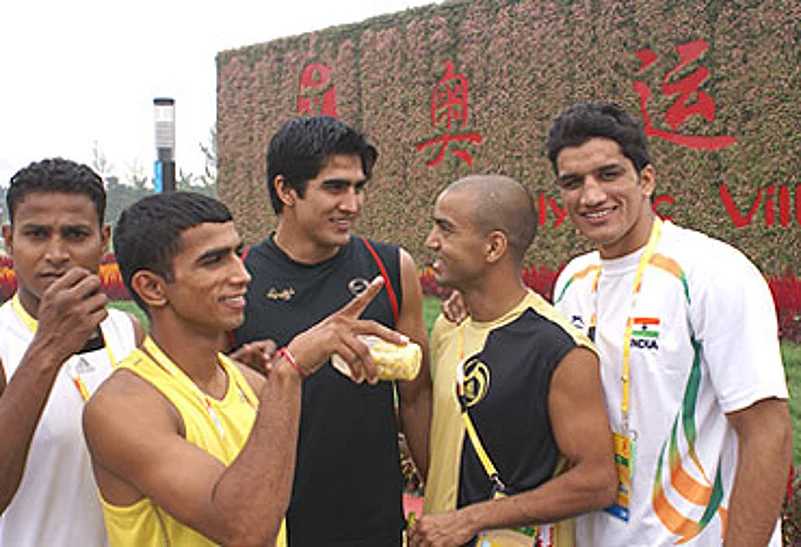A few days ago, the chief of the sports company that manages boxer Vijender Kumar declared that Jitender Kumar and Akhil Kumar-- the two Indian pugilists who lost in the quarterfinals of the Beijing Olympics-- could not get through to the semifinals because of : "calls and attention from you".
"You" is the media, whose presence is indeed becoming intolerably intrusive, but was it a factor in the defeats of Jitender and Akhil?
Akhil fought with his guard down and was ambushed by Veaceslav Gojan of Moldova. Jitender had a worry in his mind over stitches under his chin that could have opened with a strong blow and which, had they been visible, could have disqualified him. Yet, he fought gamely in going down 11-15 to Russia's GeorgyBalakshin. Vijender, who became the first Indian boxer to win a medal at the Olympic Games, did not go all the way through to the gold-- he lost his semifinal bout to a superior boxer from Cuba. Did he too lose because of the media? His manager did not say so-- he was glad enough with the bronze, attempting to maximise fiscal return from his ward's Beijing glory.
Advertisement
Sportspersons possess the central skills around which converge people with supplementary abilities-- people with skills of persuasion, description and manufacturing, forming the sports industry. A sportsperson's career-- which in itself has no real, tangible utility -- thus harbours parasitical entities which have personal interest in sporting success. Managers belong to this parasitical class, though they have a vital role to play-- they attempt to persuade those with the money that investment in sport is both a corporate responsibility and sound business.

Reporters too belong to this class, and they too have a vital role, though it's becoming diluted by the search for a saleable sound-bite.Vijender, for instance, was asked if it was all right that he, a youth icon, was photographed smoking a cigarette; he said that was for an advertising campaign, and that he'd never do it again. He was asked if it was right that his first coach be given the Dronacharya Award, despite there being a murder case against him. What could the young man say? "Yes, he should be given the award… I can't comment on the charge against him," he said."Aren't you wasting your precious time, signing a deal with sponsors," someone else asked."One has to rest too… you know nothing about boxing," Vijender said.
Advertisement
Soon after, he left the venue of the press conference. He had had enough, though he was persuaded to allow the media to have another go at him. Not a master of verbal jousting, the Bhiwani boxer could get away only after another stressful inquisition.
One could sympathise with him. Success attracts such attention, even from the celebrities who are famous only for being famous. Bipasha Basu had offered to go a date with Vijender if he won a gold medal at Beijing. Vijender said she tried to call him but got through and talked with Akhil instead. A young woman sports journalist I know declared, through her messenger status, that she wanted to "marry someone from Bhiwani, whose name started preferably with V".
It's very easy to love a winner, especially if he possesses good looks and wealth.




















